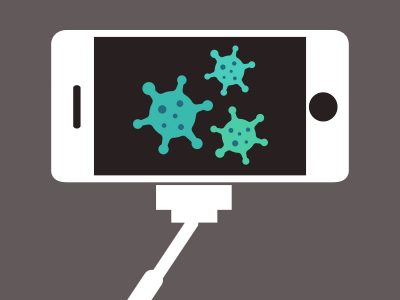Social media has become deeply embedded in our daily lives, especially during the pandemic. With more time to ourselves and less time spent in the company of others, our screens provide a vital link to the outside world.
When reflecting on the past year, it is clear that COVID-19 seriously altered our relationship with the internet.

We have had to grapple with a new, unrecognizable reality while every bit of normalcy — the aspects that once formed the framework of life as we knew it — dismantled before our eyes. The basis of regular society shattered, and social media was there to document every part of it.
In recent years, social media gradually adopted qualities that go beyond its standard function of communicating or sharing content. The nuances of social media today involve a much deeper commitment to our public image and controlling how the world views us.
COVID-19 has become increasingly politicized through the screens of our phones. Our political stances in regard to the virus and the vaccine are often broadcasted through social media, which compels more people to join in the conversation.
Our virtual identities are very much a part of how we socially engage, and now more than ever, the presence we build online is linked to our political ideologies. With the arrival of vaccinations, social media has catalyzed a brand-new trend of taking a selfie while getting inoculated — a “vaxxie.”
Health professionals advocate for this selfie sharing because it endorses the vaccine and shows it’s safe to receive.
However, the implications of these photos are not so simple.
While this messaging fosters a sense of hope and encourages people to get vaccinated when they can, this social media trend can also be somewhat insensitive to those who are still suffering at the hands of COVID-19.

Millions of people have died — and continue to die — at the hands of the virus, and many people are still mourning loved ones while struggling to survive through the economic and emotional turmoil wrought by the pandemic. People are in pain, and the “vaxxies” plastered all across the internet can come off as an ignorant dismissal of that.
Posting a playful photo of yourself getting vaccinated is sending more than a message of positivity and progress. It also conveys how you get the privilege of celebrating your health and safety while many others continue to struggle.
This can create resentment among people who do not have access to the vaccine yet, perpetuating the divisiveness that is already so prominent in our country.
Where do we draw the line on what should and should not be publicized and exploited?
It goes without saying that the distribution of COVID-19 vaccines is clearly an extremely positive light at the end of a very dark tunnel, and the celebration of the COVID-19 vaccine is more than warranted. The unrest lies in using social media to document these things.
We should always think about how our online posts are perceived and how social media trends impact all aspects of society, on and offline
The virus has impacted everyone differently, and that’s something we need to consider when we post anything related to the pandemic. Our online behavior can have a much larger impact than we imagine.
Online trends, as seen through the popularization of “vaxxies,” reveal just how connected and significant our online presences have become. Social media continues to deepen and intensify conversations about COVID-19, among other issues, and the emergence of vaccination selfies is an extension of those conversations.
As such, we must be careful when initiating productive discussions and determining what is necessary and what is tone-deaf.




